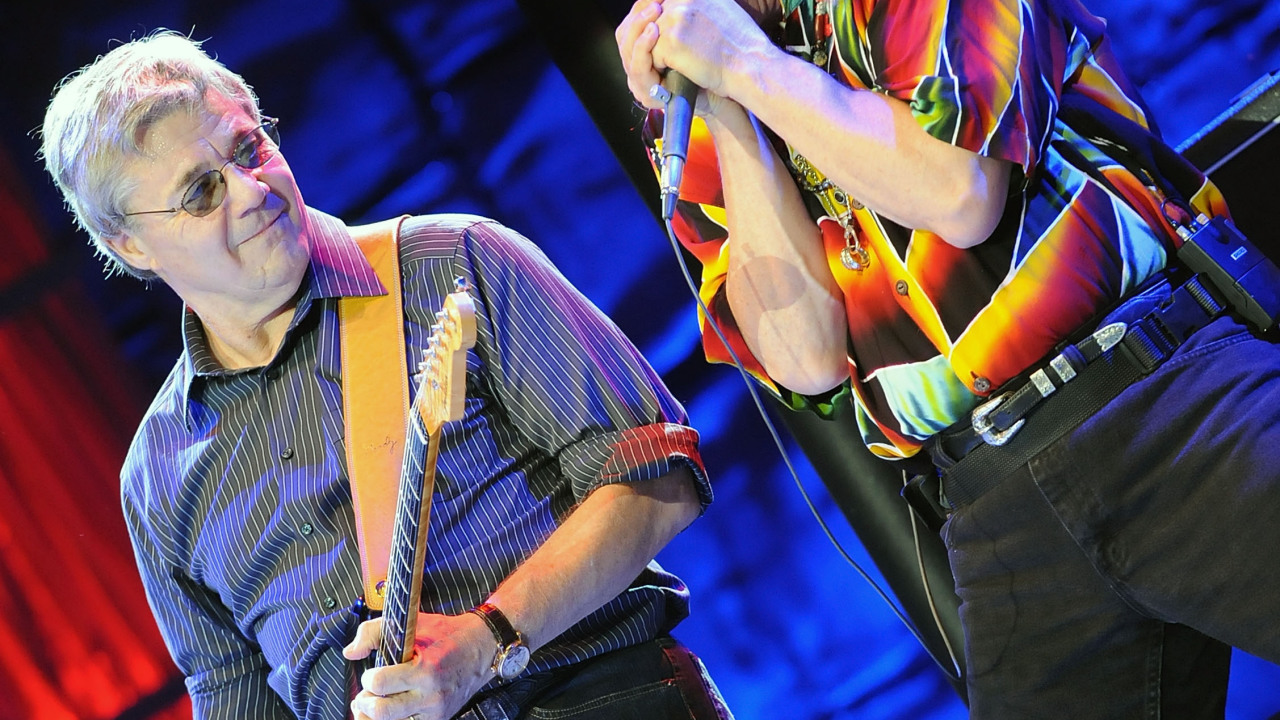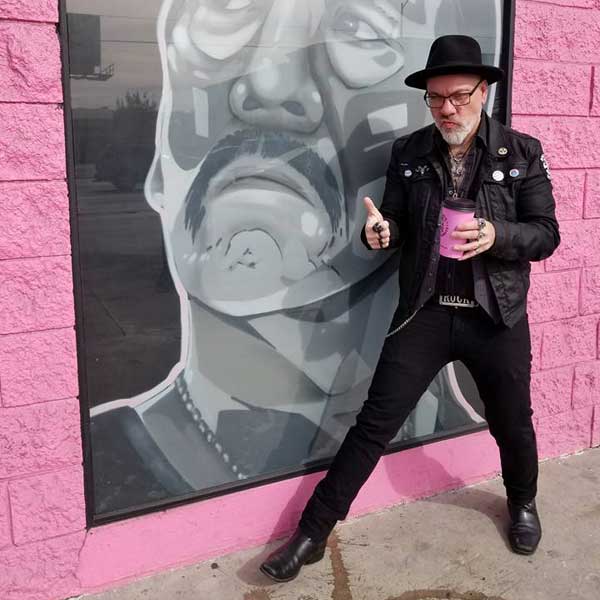While he is known mostly for his impressive pile of mid-70s-to-early- 80s hits – The Joker, Fly Like an Eagle, Take The Money And Run, Jungle Love, Abracadabra et al – Steve Miller is much more than a perennially touring, solid-gold jukebox. He’s also a rock chameleon who has weathered every musical trend, and even started a few himself along the way. Whether it was first-generation rock’n’roll in the 50s, blues and psychedelia in 60s, pop and soft rock in the 70s and whatever he damn well pleased from that point on, Miller and his effortlessly fluid guitar have been there and thoroughly rocked the roof right off the joint. Even now, a good 26 years after his last hit single, Miller stills fills stadiums; grey-beards mingle with nubile young things, and everybody has the time of their lives. And it will remain this way, seemingly forever. Because somewhere deep inside, we all want to be the joker, the smoker, the midnight toker. We all want to fly like an eagle, man. And Steve Miller can show you how.
You started playing in bands in high school.
I actually started in seventh grade, in 1956. We had, I think, the first or second rock’n’roll band in Dallas. There weren’t any rock’n’roll bands when we started.
Were you the cool kinda rock’n’roll band with leather jackets and greasy hair, or were you the nerdy kind with suits?
We were extremely cool. We wore Ray Ban sunglasses and seersucker suits and skinny neckties. Whatever was considered cool at the time, we were certainly working it as hard as we could.
*With guitar legend Les Paul as a godfather, you career trajectory seemed pretty obvious. But did you ever have aspiration to do anything other than play the guitar? *
You know, when I was at college I never thought it would be possible to make a living as a musician. Back in the 50s and 60s, being a musician was playing in nightclubs. People didn’t have concerts like they do now. And it was a tough way to make a living. It just seemed beyond me.
When I got to college I wanted to be a teacher. I was very interested in literature and creative writing. And after four years of college I just went: “I have to be a musician. I can’t do anything else. This is all I want to do.” So I made that decision and headed to Chicago to play the blues.
It sounds so, “Oh, Les Paul taught you how to play guitar, it was all handed to you, you lucky guy,” but it wasn’t anything like that. The fact that I’m still playing and doing concerts is a tribute to the quality of my band and a lot of hard work.
When you moved to Chicago and started playing with all these blues legends, that must have been a dream come true.
It was great. When I first got to Chicago I saw the Paul Butterfield Blues Band. Paul had just gotten a record contract and had just been written up in Time magazine. That’s when a light-bulb went on in my head. I got there and they’re treating Paul like this big ‘artist’. And I thought: “Ha! I can do that!” I thought: “Maybe I can pull this off.” That’s when I got really serious about it.
But then after a just few years in Chicago you split for California.
Well, Chicago was a very tough city. That’s why I was so eager to get out of there and get to San Francisco. I really liked the idea of places like the Family Dog and the Fillmore where you could play to 1,500 people in one night. It seemed so much better than playing in a nightclub from 9 o’clock at night until four in the morning, where there were drugs, where there was drinking, fights in the back, there was always trouble all the time.
With you having come from the Chicago blues scene, then suddenly you’re hanging out with all these hippies, was there much of a culture clash?
No, there was none. The thing was, the scene was getting going when I arrived, and I was much more professional than, say, Quicksilver Messenger Service or Big Brother, or the Grateful Dead. They had all been folk musicians who had seen The Beatles and Rolling Stones, who said: “Let’s get some boots, and we’ll grow our hair long, and we’ll buy an electric guitar and a big amp, and now we’re a rock band.”
When I showed up I had been playing amplified music since 1956 and I had a really tight band. They just welcomed us with open arms, and I went right to work and added to the scene. We kept the Fillmore open. I had no idea it was that much. We were a real important part of keeping that scene going. I think we eventually played the Fillmore 102 times. Last time I played there they gave me a little list of all the times I played there, and I was shocked.
So finally, after years of hard work, you had a hit single in 1972 with The Joker. And then the hits just kept coming. What was life like for you in the mid 70s? Did you have a private plane? Did you buy a castle?
No. It was very hard work. It was touring all the time; commercial flights everywhere, no private jets. Things were changing. We started out in ’76 with Fly Like An Eagle. We were playing theatres then. Soon as that tour was over we turned around and did 15,000-seat arenas. And then as soon as that tour was over we turned around and started doing football stadiums. And there really wasn’t any glamour to this, it was just work, work, work. It was: “When’s the next record coming out?” “When are you going to record the one after that?” By 1978 I was a very tired guy. I didn’t have much of a life.
**It seems like after that period though you were able to follow your own path. **
Well, we followed that up with Abracadabra [’82] which was a No.1 record, but after that I took a break for about five years. The punk scene was coming on, and all of a sudden we were being referred to as dinosaur groups.
It had seemed like we’d been around forever, and new stuff was coming. So I figured great, I’ll take a break for a bit.
After about four years of not performing I was getting offers all the time to play. Classic rock radio had started up. The next thing I knew, the greatest hits started selling and selling and selling. Also in the 1980s, sheds [huge venues] started developing. By the end of the 1980s every major city had a shed you could play at. We went back out in 1988, and by 1989 we were doing 40-date summer tours. Like I’m about to do now.
You’ve been through four decades of rock’n’roll now. Which one of them has been your favourite?
This one, absolutely. It’s better than it’s ever been. You know, you asked: “In the 70s were you flying around in a private jet?” I wasn’t. But I am now!
THE ROAD TO THE BEATLES
“I made my first album in London, at Olympic studios. Glyn Johns was my engineer, and he was also recording The Beatles, so he introduced me to Paul McCartney.
“It was 1969, and The Beatles were just finishing their last album [Abbey Road]. So we did some recording together, and we hung out, just before they broke up. It wasn’t really like I was ‘hanging out’ with them. It was really just around the studio. Although I did go to George’s house once. And I got to spend some time with Paul, John and George, and watched them work in the studio a bit. That was pretty amazing.”
DID YOU KNOW?
The Steve Miller Band backed Chuck Berry in 1966 on his Live At Fillmore Auditorium album. They were billed just as The Miller Band.
Johnny Depp references the Steve Miller band song The Joker in the movie Dark Shadows.
Miller was born in Milwaukee.
He started first band The Marksmen when he was 12 years old.
he successfully sued rap band The Geto Boys in 1990 for using The Joker without permission.

